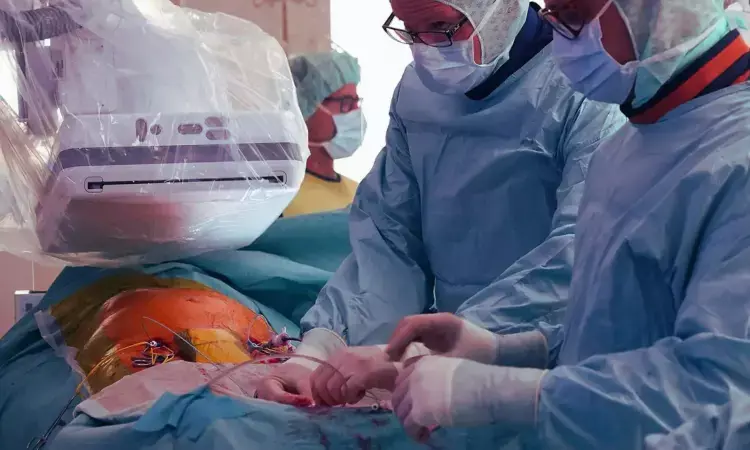- Home
- Medical news & Guidelines
- Anesthesiology
- Cardiology and CTVS
- Critical Care
- Dentistry
- Dermatology
- Diabetes and Endocrinology
- ENT
- Gastroenterology
- Medicine
- Nephrology
- Neurology
- Obstretics-Gynaecology
- Oncology
- Ophthalmology
- Orthopaedics
- Pediatrics-Neonatology
- Psychiatry
- Pulmonology
- Radiology
- Surgery
- Urology
- Laboratory Medicine
- Diet
- Nursing
- Paramedical
- Physiotherapy
- Health news
- Fact Check
- Bone Health Fact Check
- Brain Health Fact Check
- Cancer Related Fact Check
- Child Care Fact Check
- Dental and oral health fact check
- Diabetes and metabolic health fact check
- Diet and Nutrition Fact Check
- Eye and ENT Care Fact Check
- Fitness fact check
- Gut health fact check
- Heart health fact check
- Kidney health fact check
- Medical education fact check
- Men's health fact check
- Respiratory fact check
- Skin and hair care fact check
- Vaccine and Immunization fact check
- Women's health fact check
- AYUSH
- State News
- Andaman and Nicobar Islands
- Andhra Pradesh
- Arunachal Pradesh
- Assam
- Bihar
- Chandigarh
- Chattisgarh
- Dadra and Nagar Haveli
- Daman and Diu
- Delhi
- Goa
- Gujarat
- Haryana
- Himachal Pradesh
- Jammu & Kashmir
- Jharkhand
- Karnataka
- Kerala
- Ladakh
- Lakshadweep
- Madhya Pradesh
- Maharashtra
- Manipur
- Meghalaya
- Mizoram
- Nagaland
- Odisha
- Puducherry
- Punjab
- Rajasthan
- Sikkim
- Tamil Nadu
- Telangana
- Tripura
- Uttar Pradesh
- Uttrakhand
- West Bengal
- Medical Education
- Industry
Single-setting complete revascularization promising in reducing CV events in acute MI patients with multivessel disease: Study

USA: Recent evidence supports complete revascularization in one procedure for individuals with acute myocardial infarction (MI) and multivessel coronary artery disease (CAD), according to an updated network meta-analysis.
"In patients with acute MI and multivessel disease, single-setting complete revascularization (CR) may offer the greatest reductions in cardiovascular (CV) events, the researchers wrote in Circulation: Cardiovascular Interventions.
Complete revascularization improves CV outcomes compared with culprit-only revascularization in acute MI patients (ST-segment–elevation MI or non–ST-segment–elevation MI) and multivessel CAD. Yet, the optimal timing of complete revascularization (single-setting versus staged) remains uncertain. Considering this, Sripal Bangalore, Division of Cardiovascular Medicine, New York University Grossman School of Medicine, and colleagues aimed to compare the outcomes of single-setting complete, staged complete, and culprit vessel–only revascularization in acute MI and multivessel disease patients.
For this purpose, the researchers searched online databases for randomized controlled trials that compared three revascularization strategies.
The study led to the following findings:
- From 16 randomized controlled trials that randomized 11 876 patients with acute MI and multivessel disease, both single-setting complete and staged complete revascularization reduced primary outcome (cardiovascular mortality/MI; odds ratio [OR], 0.52; OR, 0.74), composite of all-cause mortality/MI (OR, 0.52; OR, 0.78), major adverse cardiovascular event (OR, 0.42; OR, 0.62), MI (OR, 0.39; OR, 0.73), and repeat revascularization (OR, 0.30; OR, 0.46) compared with culprit-only revascularization.
- Single-setting complete revascularization reduced cardiovascular mortality/MI (OR, 0.70), major adverse cardiovascular events (OR, 0.67), and all-cause mortality/MI driven by a lower risk of MI (OR, 0.53) compared with staged complete revascularization.
- Single-setting complete revascularization ranked number 1, followed by staged complete revascularization (number 2) and culprit-only revascularization (number 3) for all outcomes.
- The results were largely consistent in subgroup analysis comparing ST-segment–elevation MI versus non–ST-segment–elevation MI cohorts.
Despite the advantages of single-stage complete revascularization, the staged strategy is expected to maintain an important role in clinical practice, suggested Daniel Chamié, MD, PhD, of Yale School of Medicine in New Haven, Connecticut, and Steven Pfau, MD, of VA Connecticut in West Haven, in an accompanying editorial.
"The next challenge lies in identifying which patients will benefit from immediate versus staged complete revascularization. Specifically, it is crucial to determine which patients will derive the greatest benefit from early staged CR and which patients can safely postpone staged CR until after discharge," they wrote.
The findings showed that the single-setting complete revascularization may offer the best efficacy (composite CV mortality or myocardial infarction) in patients undergoing PCI for acute MI (STEMI or NSTEMI).
"There is a compelling need for a large-scale randomized trial comparing single-setting complete revascularization with staged complete revascularization to determine the optimal timing for complete revascularization," the study authors concluded.
Reference:
Maqsood MH, et al "Culprit-only revascularization, single-setting complete revascularization, and staged complete revascularization in acute myocardial infarction: insights from a mixed treatment comparison meta-analysis of randomized trials" Circ Cardiovasc Interv 2024; DOI: 10.1161/CIRCINTERVENTIONS.123.013737.
Dr Kamal Kant Kohli-MBBS, DTCD- a chest specialist with more than 30 years of practice and a flair for writing clinical articles, Dr Kamal Kant Kohli joined Medical Dialogues as a Chief Editor of Medical News. Besides writing articles, as an editor, he proofreads and verifies all the medical content published on Medical Dialogues including those coming from journals, studies,medical conferences,guidelines etc. Email: drkohli@medicaldialogues.in. Contact no. 011-43720751


